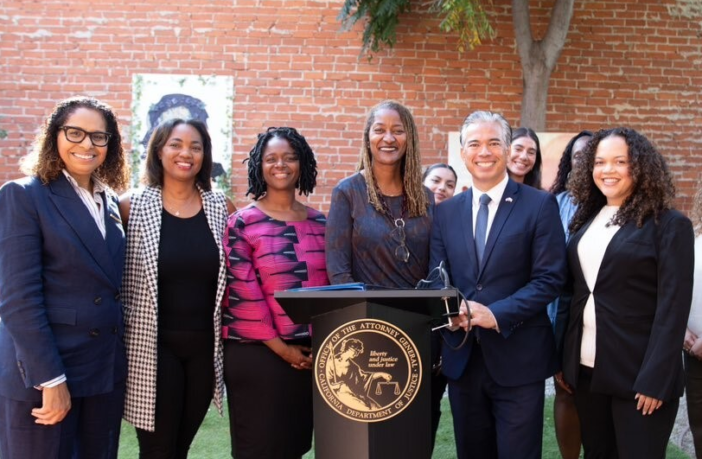(From Left to Right) U.S. Rep. Sydney Kamlager-Dove (D-CA-37), Assemblymember Akilah Weber (D-La Mesa), Sen. Lola Smallwood-Cuevas (D-Ladera Heights), L.A. County Supervisor Holly Mitchell, California Attorney General Rob Bonta and Gabrielle Brown, Black Women for Wellness Maternal and Infant Health Program Coordinator, at a California Department of Justice press conference.
*“Shameful” Cal DOJ Report: Hospitals Ignored Racial Bias Training Mandated to Address Black Women’s High Maternal Death Rate is highlighted in today’s California Black Media Political Playback. Four years ago this month, Senate Bill (SB) 464, also known as California’s Dignity in Pregnancy and Childbirth Act, was signed into law by Gov. Gavin Newsom.
The law, authored by LA County Supervisor Holly Mitchell, when she served in the State Senate, mandated that healthcare facilities implement training to address unconscious racial bias toward expectant mothers to address California’s high maternal death rate among Black women. However, a report released by the California Department of Justice on Oct. 27, four years after the law was enacted, found that most hospitals and clinics either failed to implement the training or instituted it late.
“The disparity in maternal death rates in California reflects the deep and shameful racial inequities in our healthcare system,” said Attorney General Rob Bonta in a statement the DOJ released Friday.
“In California, people of color, particularly Black women, continue to die at three to four times the rate of White women,” Bonta continued. “This is unacceptable. With today’s report, the California Department of Justice has taken an important step forward in addressing this issue by successfully building upon the California Dignity in Pregnancy and Childbirth Act.”
According to Bonta, the United States has the highest maternal death rate in the developed world. He disclosed that one year into the program, less than 17% of health facilities in the state had initiated the mandated staff training, as reported to the DOJ.
 Black college graduate celebrating
Black college graduate celebrating
For Black Students, Cal State’s Graduation Is Less Than 50%
In other California Black Media Political Playback news, less than half of the Black students enrolled at California State University (CSU) campuses graduate.
That troubling statistic was one data point in an announcement released by CSU during its Graduation Initiative symposium Oct. 2023 in San Diego.
Overall, the data painted a positive picture of student performance at CSU, but the Black student graduation rate at 47% stuck out as a dim spot.
The difference in graduation rates between students from historically underserved backgrounds and their peers remains an ongoing challenge for the CSU system. For example, the graduation rates for all historically underserved students and Pell Grant recipients increased by one percentage point each over the last year.
“We recognize this important opportunity to engage and collaborate with our larger community to narrow equity gaps so that all students have an opportunity to earn a life-changing college degree,” acknowledged Jennifer Baszile, CSU associate vice chancellor of Student Success & Inclusive Excellence. “This work is a moral imperative for the CSU, and it is essential for meeting California’s need for a thriving, diverse workforce.”
The report indicated that four-year graduation rates remain flat for the 23-campus system.
On the upside, the data reveals that CSU undergraduate students are earning their degrees at faster rates than ever before and are now graduating an average of one semester earlier compared to when the Graduation Initiative 2025 was initiated.
The information released shows that CSU’s systemwide four-year graduation rate for first-year students remains at 35%, nearly doubling the rate (19%) at the launch of the initiative in 2015.
The improved outcomes, combined with enrollment increases, have contributed to an additional 150,000 bachelor’s degrees earned. But as CSU looks past the year 2025, its administrators plan to devise strategies to improve outcomes for all students, with a particular focus on Black student success and other historically underserved groups.
Larry Elder Bows Out of 2024 Presidential Race; Endorses Donald Trump
On Oct. 26, Larry Elder, the Los Angeles-based conservative radio talk show host and former California gubernatorial candidate, announced that he is dropping out of the 2024 U.S. Presidential race.
In the same announcement, which he posted on the social media site X, Elder endorsed former President Donald J. Trump for POTUS.
“I have been steadfast in my belief that the biggest issues facing our nation are the crisis of fatherlessness, the dangerous lie that America is systemically racist, the need for an amendment to the constitution to set federal spending to a fixed percentage of the GDP,” Elder wrote.
Among other priorities, the man who frequently refers to himself as the “Sage from South Central,” said he is an advocate for smaller government, and he wants to replace District Attorneys across the country he believes are backed by the Left-leaning billionaire George Soros.
Elder said Trump’s leadership has been “instrumental in advancing conservative, America-first principles and policies.”
Willie Brown and Nancy Pelosi Featured in San Francisco “Comeback” Ad
A group of San Francisco business leaders officially launched an ambitious public image campaign featuring two luminaries among the city’s most accomplished politicos: former House of Representatives Speaker Nancy Pelosi and former San Francisco Mayor Willie Brown.
The goal of the campaign, supporters say, is to remind the world why San Francisco will remain one of America’s greatest cities despite the barrage of negative press the Golden Gate City has been getting in media across the globe.
A one-minute video anchors the campaign titled “It All Starts Here” which takes viewers on a journey through San Francisco’s history.
The campaign celebrates all that makes the San Francisco Bay Area unique – emphasizing its diverse, homegrown companies, institutions, and intellectual property. The creation of the campaign emerged after San Franciscans grew frustrated with how the city’s image was being portrayed negatively.
 California’s are leaving moving to Texas and Arizona
California’s are leaving moving to Texas and Arizona
“California Draining”: Stanford Report Explores Why More Californians Are Moving to Texas and Arizona Than Ever Before
From the Gold Rush of the 1800s to the iconic unofficial state song “California Dreamin,’” the Golden State has built an enviable reputation. It has become known around the world as a destination for fortune seekers, economic opportunities, and a laidback West Coast lifestyle made more desirable by pleasant weather and a picturesque natural landscape that incorporates breathtaking scenes — from the Pacific coast cliffs and glistening inland lakes to snow-capped mountains and lush forests housing the earth’s oldest tree species.
However, over the last few years, that perception of California’s exceptional desirability is being challenged as the state loses population to Arizona and Texas at higher levels than ever before, including a greater share of college graduates and residents at all income levels, according to a report dubbed “California Draining,” released by the Stanford Institute for Economic Policy Research (SIEPR).
“California lost a net of 407,000 residents to other states between July 2021 and July 2022, including a greater share of those with a college degree and residents at all income levels than in the past,” the report reads.
The state’s high cost of living has spurred many businesses and residents to exit, posing serious consequences for the state’s job market and fiscal outlook. California is still the largest state with more than 39 million residents as of 2022, constituting 11.7 % of the U.S. population, according to SIEPR’s report.
From 1959 to 2022, California’s average rate of population growth was 1.52 percent, but since 2000, it has been consistently below that number. The state even experienced negative growth in 2021 and 2022.
Among recent movers, Black residents make up about 12% of people exiting the state, a significant number in a state where the total Black population hovers around 5.7 %.
The report states that two-thirds of those who moved said that politics was not a factor in their decision, but the population loss has political consequences: California lost a congressional seat after the 2020 census.
SIEPR draws from an original survey of residents in California, Arizona, and Texas conducted jointly by researchers at Stanford University, Arizona State University, and the University of Houston.
MORE NEWS ON EURWEB: California Black Media Political Playback: Black Candidates Are Queuing Up for Intense Political Battles Ahead
We Publish News 24/7. Don’t Miss A Story. Click HERE to SUBSCRIBE to Our Newsletter Now!



